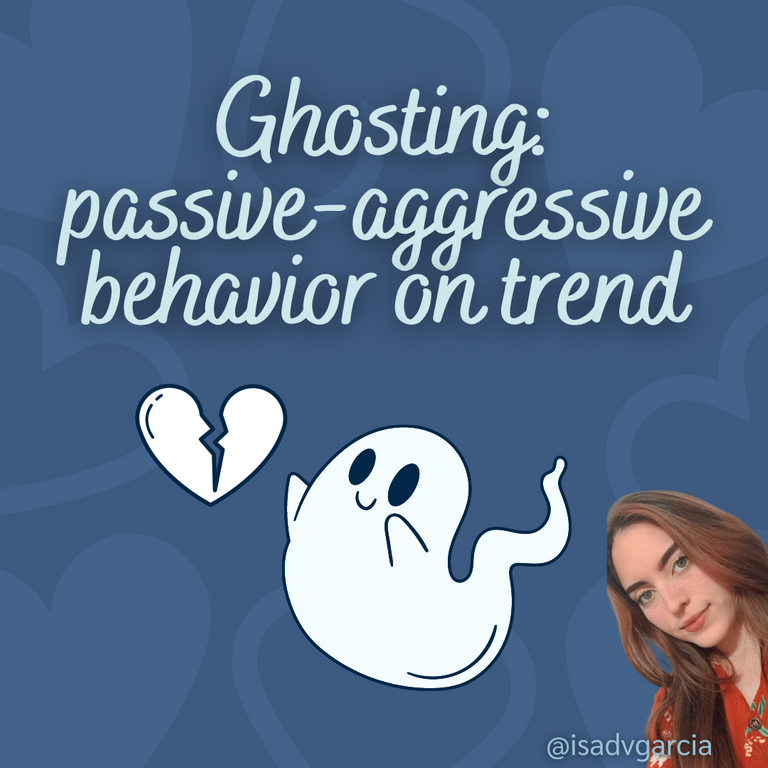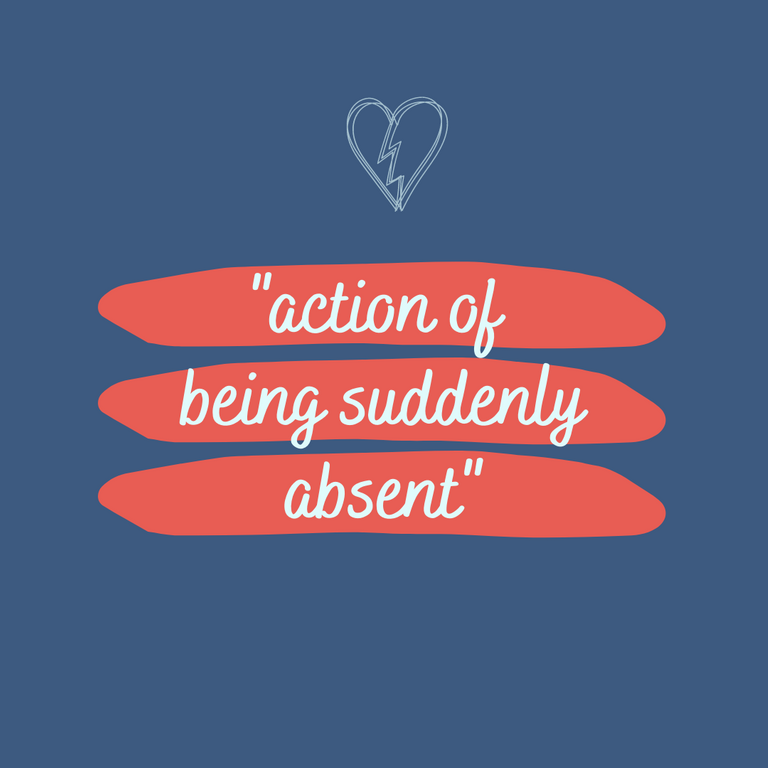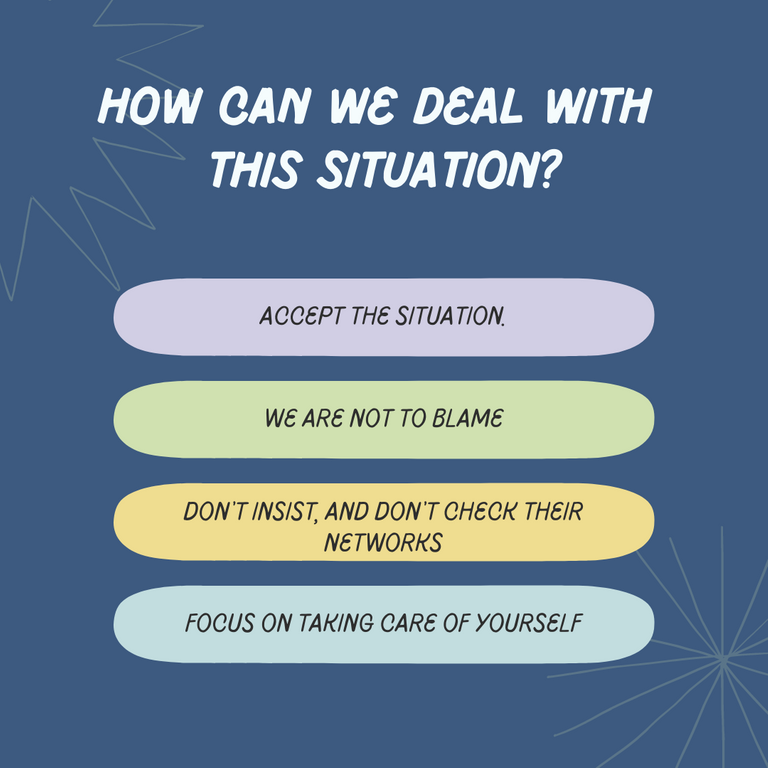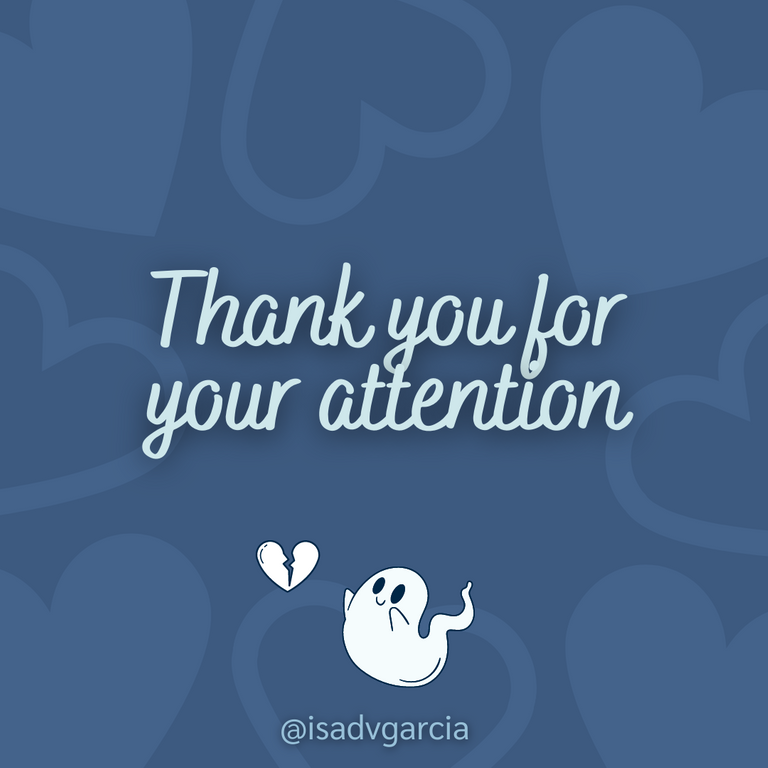Maybe we have heard a friend say ¨everything was going perfect and suddenly disappeared¨. Today I will talk a little about these "disappearances" that hurt us psychologically and emotionally.

Ending a relationship or feeling rejected by a person we love can be a difficult and painful process to understand and assume. But when we talk about ghosting it can lead the person to suffer traumas.
The ghosting could be defined as the action of being absent suddenly, that is to say, leaving the contact without previous warning with a partner, friend or any person with whom we have some kind of link. It also includes the later part where the person is ignored, and can even reach the point of blocking the person to avoid the slightest approach. This action usually leaves a great series of questions/doubts. Being the one who walks away or the other person hurts deeply because many of the insecurities that were hidden are reinforced.
Ghosting can be intermittent (disappearing days weeks or even months). and definitive.

Many times ghosting is often confused with zero contact, but we must keep in mind that the second is used when you want to end a bad relationship (toxic, mistreatment, among others). In short, the difference is that ghosting occurs when the relationship seems to be going well, while zero contact occurs when a relationship that has had the opportunity to resolve differences or conflicts is not achieved.
The main causes of ghosting have very little to do with the other person, namely its value and more clinging to the maturity, impulsivity, inability to solve problems, irresponsibility affective of the other person. In fact, many people who practice this passive-aggressive behavior do not realize the psychological damage it can cause to the other person, such as the impossibility of developing a grief.
Emotional distress may involve feelings of anguish, guilt, misunderstanding, anxiety, emotional dependency, insecurity, mistrust, low self-esteem, anger, among others. Often the victim of ghosting, out of desperation, tends to insist. If we act in this way, the probability that the other person thinks he/she has done something very serious is inevitable. Isn't a truth that hurts better than an uncertainty that weighs?

How can we deal with this situation?
- Accept the situation.
-It is essential to keep in mind that we are not to blame for the situation. And even if we have made a mistake, the solution would never be to break up in this way. - Think about what happened in a learning way and do not cling to the situation.
- Don't insist, and don't check their networks.
- Focus on taking care of yourself.
- Lastly, let's not minimize our hurts to others, nor naturalize the event.
I hope you have a great weekend!

Versión en Español
Quizás hemos escuchado a una amiga decir ¨todo iba perfecto y repentinamente desaparecido¨. Hoy les hablare un poco acerca de estas ¨desapariciones¨ que nos lastiman psicológica y sentimentalmente.
Terminar una relación o sentirse rechazado por una persona que queremos puede ser un proceso difícil y doloroso de entender y asumir. Pero cuando hablamos de ghosting puede llevar a la persona a sufrir traumas.
El ghosting lo podríamos definir como la acción de ausentarse repentinamente, es decir, dejar el contacto sin advertencia previa con una pareja, amigo/a u alguna persona con la que tengamos algún tipo de vinculo. También incluye la parte posterior donde se ignora a la persona, y puede llegar al punto hasta de bloquearla para evitar el más minimo acercamiento. Esta acción suele dejar una gran serie de preguntas/dudas. Ser el que se aleja o la otra persona duele profundamente porque muchas de las inseguridades que estaban ocultas son reforzadas.
El ghosting puede ser intermitente (que desaparece días semanas o incluso meses). y definitivo.
Muchas veces se suele confundir el ghosting con contacto cero, pero debemos tener en cuenta que el segundo es usado cuando se desea terminar una mala relación (toxica, de maltrata, entre otros). En definitiva su diferencia es que el ghosting se da cuando la relación parece ir bien, en cambio el contacto cero se da cuando una relación que ha tenido la oportunidad de resolver diferencias o conflictos no se logra.
Las principales causas del ghosting tiene muy poco que ver con la otra persona, dícese su valor y más se aferrada a la madurez, impulsividad, incapacidad de resolver problemas, irresponsabilidad afectiva de la otra persona. Realmente muchas personas que practican esta conducta pasivo- agresiva no se dan cuentan del daño psicológico que puede causar a la otra persona como la imposibilidad de desarrollar un duelo.
El malestar emocional puede involucrar sentimientos de angustia, culpa, incomprensión, ansiedad, dependencia emocional, inseguridad, desconfianza, baja autoestima, enojo, entre otros. Muchas veces la victima del ghosting, por su misma desesperación, suele insistir. Si actuamos de esta manera la probabilidad de que la otra persona piense haber hecho algo muy grave es inevitable ¿No es mejor una verdad que duele a una incertidumbre que pesa?
¿Cómo podemos lidiar con esta situación?
- Acepta la situación.
-Es fundamental tener en cuenta que no somos los culpables de la situación. Y aunque hayamos cometí un error, la solución nunca seria un rompimiento de esta forma. - Piensa en lo sucedido de una manera de aprendizaje y no te aferres en a la situación.
- No insistas, ni revises sus redes.
- Céntrate en cuidarte
- Por ultimo, no minimicemos nuestras heridas ante los demás, ni naturalicemos el hecho.
¡Espero tengan un excelente fin de semana!